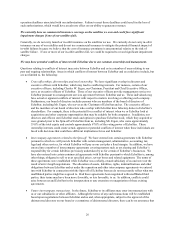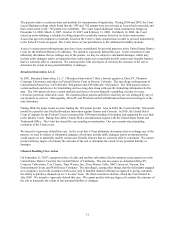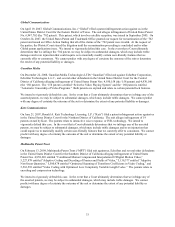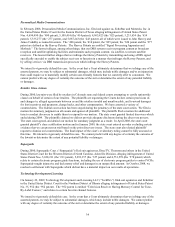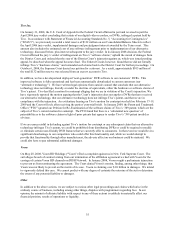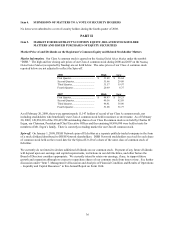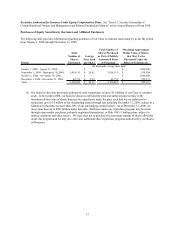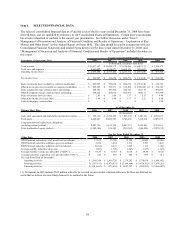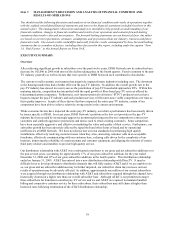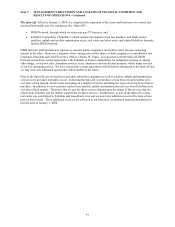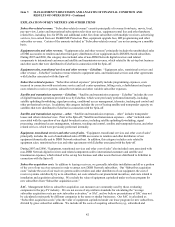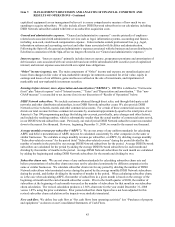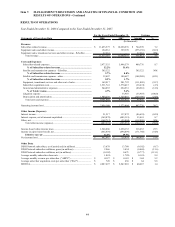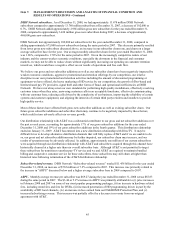Dish Network 2008 Annual Report Download - page 45
Download and view the complete annual report
Please find page 45 of the 2008 Dish Network annual report below. You can navigate through the pages in the report by either clicking on the pages listed below, or by using the keyword search tool below to find specific information within the annual report.35
Tivo Inc.
On January 31, 2008, the U.S. Court of Appeals for the Federal Circuit affirmed in part and reversed in part the
April 2006 jury verdict concluding that certain of our digital video recorders, or DVRs, infringed a patent held by
Tivo. In accordance with Statement of Financial Accounting Standards No. 5, “Accounting for Contingencies”
(“SFAS 5”), we previously recorded a total reserve of $132 million on our Consolidated Balance Sheets to reflect
the April 2006 jury verdict, supplemental damages and pre-judgment interest awarded by the Texas court. This
amount also includes the estimated cost of any software infringement prior to implementation of our alternative
technology, discussed below, plus interest subsequent to the jury verdict. In its January 2008 decision, the Federal
Circuit affirmed the jury’s verdict of infringement on Tivo’s “software claims,” upheld the award of damages from
the District Court, and ordered that the stay of the District Court’s injunction against us, which was issued pending
appeal, be dissolved when the appeal becomes final. The Federal Circuit, however, found that we did not literally
infringe Tivo’s “hardware claims,” and remanded such claims back to the District Court for further proceedings. On
October 6, 2008, the Supreme Court denied our petition for certiorari. As a result, approximately $105 million of
the total $132 million reserve was released from an escrow account to Tivo.
In addition, we have developed and deployed ‘next-generation’ DVR software to our customers’ DVRs. This
improved software is fully operational and has been automatically downloaded to current customers (our
“alternative technology”). We have written legal opinions from outside counsel that conclude that our alternative
technology does not infringe, literally or under the doctrine of equivalents, either the hardware or software claims of
Tivo’s patent. Tivo has filed a motion for contempt alleging that we are in violation of the Court’s injunction. We
have vigorously opposed the motion arguing that the Court’s injunction does not apply to DVRs that have received
our alternative technology, that our alternative technology does not infringe Tivo’s patent, and that we are in
compliance with the injunction. An evidentiary hearing on Tivo’s motion for contempt was held on February 17-19,
2009 and the Court will rule after receiving the parties’ post-trial briefs. In January 2009, the Patent and Trademark
Office (“PTO”) granted our Petition for Re-Examination of the software claims of Tivo’s ‘389 patent, which are the
subject of Tivo’s current motion for contempt. The PTO found that there is a ‘substantial new question’ of
patentability as to the software claims in light of prior patents that appear to render Tivo’s ‘389 patent invalid as
obvious.
If we are unsuccessful in defending against Tivo’s motion for contempt or any subsequent claim that our alternative
technology infringes Tivo’s patent, we could be prohibited from distributing DVRs or could be required to modify
or eliminate certain user-friendly DVR features that we currently offer to consumers. In that event we would be at a
significant disadvantage to our competitors who could offer this functionality and, while we would attempt to
provide that functionality through other manufacturers, the adverse affect on our business could be material. We
could also have to pay substantial additional damages.
Voom
On May 28, 2008, Voom HD Holdings (“Voom”) filed a complaint against us in New York Supreme Court. The
suit alleges breach of contract arising from our termination of the affiliation agreement we had with Voom for the
carriage of certain Voom HD channels on DISH Network. In January 2008, Voom sought a preliminary injunction
to prevent us from terminating the agreement. The Court denied Voom’s motion, finding, among other things, that
Voom was not likely to prevail on the merits of its case. Voom is claiming over $1.0 billion in damages. We intend
to vigorously defend this case. We cannot predict with any degree of certainty the outcome of the suit or determine
the extent of any potential liability or damages.
Other
In addition to the above actions, we are subject to various other legal proceedings and claims which arise in the
ordinary course of business, including among other things, disputes with programmers regarding fees. In our
opinion, the amount of ultimate liability with respect to any of these actions is unlikely to materially affect our
financial position, results of operations or liquidity.



